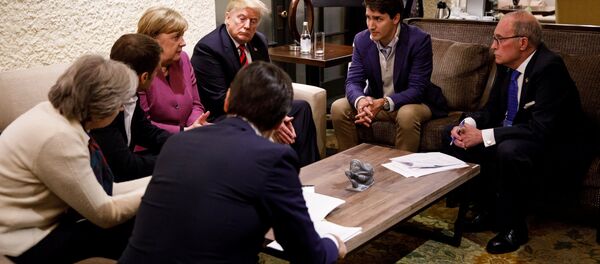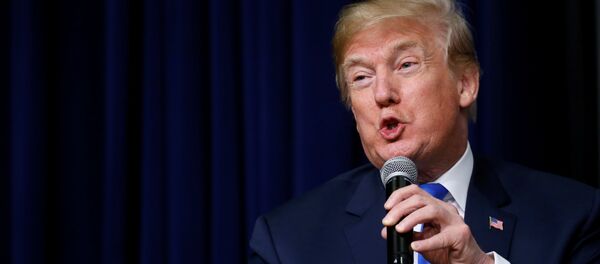Trudeau Taking Risks
After two days of negotiations, Canada, France, Germany, Italy, Japan, the United Kingdom, the United States and the European Union agreed on a final communique.
However, on Saturday, Trump, who left the summit early to attend a meeting with North Korean leader Kim Jong Un in Singapore, revoked the US agreement to the statement after watching a press conference of Canadian Prime Minister Justin Trudeau, who vowed to impose tariffs on US imports in response to the duties levied by the Trump administration on steel and aluminum imports from Canada.
Belgian politician Alain Destexhe from the Reformist Movement party believes that the summit was a failure because of Trudeau's jibe at the United States.
"Justin Trudeau has played with fire. There was an agreement. Why on earth does he feel he has to add a layer of insults and personal attacks on Donald Trump in the closing press conference? It is childish. Trudeau is responsible for this failure," Destexhe told Sputnik.
Transatlantic Partnerships in Disarray
The G7 summit showed clearly that the transatlantic alliance is not in the best shape at the moment, torn apart by squabbles over trade and defense spending, Sebastien Cochard, a member of the National Rally party in France, told Sputnik.
"The G7 discussions were just another blow to the transatlantic alliance. The explicit US threats of secondary sanctions on EU companies in commercial relations with Iran or Russia were already a big thing," Cochard said.
Washington's insistence that all NATO members should spend the required 2 percent of their GDP on defense is another sore point, according to Cochard.
READ MORE: 'Trump Can Get Away With a Lot of This': Scholar Shares His Views on G7 Summit
At the same time, "Europe has never been as unanimous as it is now," although EU countries are not in complete agreement on trade with China or Russia, Hendrik Vos, a European politics professor at Ghent University told Sputnik.
"In the past, you saw European countries that did not dare to condemn the US. That time is over, yet the disagreements within the EU are high when it comes to the future and our economic ties with China or Russia," Vos said.
Start Negotiating
The Europeans should begin serious negotiations with Trump based on the "protected exchange" model rather than unrestrained free trade, Prof. Gilles Lebreton, a French member of the Europe of Nations and Freedom Group (ENF) at the European Parliament, said.
"Europeans should begin to negotiate seriously with Trump on the basis of the new "protected exchange" model, rather than cling to their dogma of unbridled free trade. [German Chancellor Angela] Merkel will probably understand it sooner than [French President Emmanuel] Macron (too dogmatic) because she has a good handle on German interests," Lebreton told Sputnik.
Germany is not likely to respond to Trump's tariffs out of fear to hurt its own car exports, Cochard noted.
"I do not expect any retaliatory move, as Germany is too scared to be submitted to subsequent retaliation from the US. Germany is in particular scared to see its precious car exports submitted to tariffs by the US. Such an action from the US would compromise German's economic export-oriented model," the French politician said.
READ MORE: G7 Summit Participants Managed to Find 'Common Ground' Despite Debates — UK PM
Trump was right to introduce tariffs, considering the trade imbalance between the European Union and the United States, Marcel de Graaff, a Dutch politician and a co-chairman of the Europe of Nations and Freedom Group (ENF) in the European Parliament said.
"Given the trade imbalance between the US and the EU, Mr. Trump is absolutely right to take measures. The EU is a failed project. The European Commission has no position at all to lecture Mr. Trump. The UK should disembark from this sinking ship as soon as possible and join the winning team," de Graaf told Sputnik.
Return to G8
Trump went against the grain in urging for the return to G8, a format that included G7 states and Russia. The reactions of other G7 members varied: Italian Prime Minister Giuseppe Conte backed the call for the G8 restoration. Trudeau dismissed the idea as something of little interest at the moment.
Russia's potential return to G7, urged by the US president, would be a good opportunity to promote peace, according to de Graaf.
"The participation of Russia in the G8 would surely be an opportunity to promote peace through trade. We certainly don't need another cold war like the EU is encouraging," de Graaf said.
Cochard described Conte's support as a positive thing but expressed doubt over the similar reaction from other G7 states.
"Unfortunately Merkel, Macron, and May are obstructing common sense and continuing in this geopolitical and economic dead-end to refuse close cooperation with Russia. We hope for regime change within the EU as soon as possible, so to reinstall harmonious relations and collaboration with Russia," Cochard said.
Destexhe noted that the G7's insistence on excluding Russia would be detrimental to them in the long run.
"The G8 needs to integrate the most important countries of the world. The destructive attitude of Europe turns Russia away from Europe, looking East at China and the Far East. It will be detrimental to Europe in the long term," the Belgian politician said.
READ MORE: Russian Economy Prepared For Possible New Sanctions From G7 Nations — Lawmaker
In June 2014, a G8 summit was expected to take place in the Russian resort of Sochi. However, the G7 gathered in Brussels without Moscow over Crimea's reunification with Russia. Kiev did not recognize the results of the referendum held on the peninsula in March 2014, as over 90 percent of the local residents chose to join Russia. Russian officials have repeatedly stressed that the vote was held in accordance with the international legislation.
Trump Getting Ready for Midterm Elections
Trump's harsh stance on trade may be part of domestic policy as much as it is an international affairs strategy, as it could help him prepare for the upcoming midterm elections, Art Franczek, the president of The American Institute of Business and Economics in Moscow, told Sputnik.
"It is all about the mid-term elections in the United States. Trump won based on Pennsylvania, Ohio, Wisconsin primarily. What do you have there: you have steelworkers, aluminum-workers and you promised them to protect their jobs. You blamed their loss of jobs on trade policies of China, Europe, Mexico, and Canada. So what he is doing, he is fulfilling campaign promises," Franczek explained.
The Democrats taking over the House of Representatives after November elections could threaten Trump's presidency, the expert said.
"He is trying to excite his base: the steelworkers, other workers, manufactures to get them to vote for the Republicans in November. This base is against trade, against immigrants, against Iran. So he is playing to his base. This is all behind of a lot of these issues. It is part of Trump's strategy to disrupt everything. Trump is again going against what a popular opinion is," the president of The American Institute of Business and Economics said.
Franczek pointed to Trump's book The Art of the Deal, stressing that the president was using the tactics described in the book.
Trade Wars Looming
Director General of the Brussels Chamber of Commerce Olivier Willocx agreed that the US measures would affect the GDP growth for Belgium, as well as for Germany, France, Italy and the Netherlands.
READ MORE: G7 Summit: Trump Trying to Prevent US From Losing 'Superpower' Status — Analyst
"The growth perspectives of the Belgian economy are already impacted by the present US measures following the National Bank. The growth rate will decline from 1.8 to 1.6 percent of GDP this year. It is probably the same figures for Germany, France, Italy or the Netherlands," he said.
Willocx stressed that possible retaliation and the second wave of tariffs or sanctions would "weigh heavily on the economy and decapitate the growth rate."
Belgian Trade Minister Pieter De Crem told Sputnik that the US import duties might cost Belgium up to 4 billion euros ($4.8 million).
The views expressed in this article are solely the speakers and do not necessarily reflect the official position of Sputnik.




